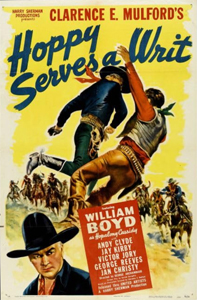“Hoppy Serves a Writ” (1943) is a playful romp of a film. That’s probably the best that can be said of it. It survives from a day when cheap movies were made even cheaper and more carelessly than the careless, cheap films of today.
An ineffective melodramatic Western
“Hoppy Serves a Writ” is the 43rd of 66 low budget Hopalong Cassidy features (or “Hoppies” as they were called). It was based on a novel of the same name – the last of Clarence Mulford’s 28 “Cassidy” paperbacks.
(In the books, the fictional character hops along on a wooden leg, thus his nickname. In the movies, the Texas lawman limps a bit in the first film following a gunshot to his thigh. In this one, I failed to discern even a slight totter, though he is atop his horse in the majority of scenes. Still, he retains the nickname Hopalong.)

“Hoppy Serves a Writ” (1943)
Director: George Archainbaud
Writers: Gerald Geraghty (screenplay), Clarence E. Mulford (story, novel)
Stars: William Boyd, Andy Clyde, Jay Kirby
Hollywood star Robert Mitchum – credited as Bob Mitchum – appears here in one of his first film roles, as a henchman. He’s convincing and well-cast.
Besides Mitchum, there are two redeeming aspects of this brisk 67-minute Western: its black and white outdoor cinematography and the equestrian/roping skills on display. Even the film’s scenery, however, is marred by an incessantly overblown orchestral score that insists on treating a ride to inspect the scene of a local crime like the climax of the Battle of Waterloo.
The crime in question? The robbery of a stagecoach. The culprits have taken the loot and fled over a shallow river separating Texas from neighboring Oklahoma Territory. This jurisdictional head-scratcher requires a clever lawman like Hoppy to unravel it.
Clumsy comedic interludes lacking humor
Clunky exposition explains the dilemma: The sheriff and his deputies cannot follow the bandits into Oklahoma because it is void of legal structure; it’s ungoverned. A lawman without the law would be ineffectual. At the same time, Hoppy reasons, if the bandits were apprehended by Texas lawmen operating outside of Texas, a legal quagmire between competing sovereigns would certainly result.
So, which is it, too little law, or too much of it? We never find out.
We do find out how the bandits are ultimately apprehended. One might expect that all the suspense over how the sheriff will untie his jurisdictional Gordian knot is spoiled by the film’s title – with Hoppy serving a writ or warrant. But, in fact, the film manages to conceal the solution whereby Hoppy can effectively serve the bandits with an arrest writ until the final frames.
Boy oh Boyd
Actor William Boyd’s portrayal of Hopalong Cassidy is earnestly cheesy. He will remind some viewers of Yul Brynner’s magnetic portrayal of a cyborg in the original “Westworld.” Boyd’s Hopalong is only slightly less robotic and what characterization he does bring to the film is more than offset by a goofy grin and distracting costuming choices.

His sheriff’s favored outfit seems to have been constructed of a one-piece button-down spandex leotard with a deep V-neck accessorized with a flowing scarf, a bullet-lined belt and a hat a buckaroo could practically bathe in.
Like an authentic cowboy, however, Boyd’s Hopalong does not tuck his leotard pants into his boots. The outfit seems like an unintended joke. Other slapstick interludes and comedic touches reach their high point with a line like this one: “Punching cows is our specialty – that is, providing they don’t punch back.”
“Hoppy Serves a Writ” fails to elicit humor at most of the funny parts and is simply ridiculous at all of the dramatic ones. It’s clownish and disappointing.

